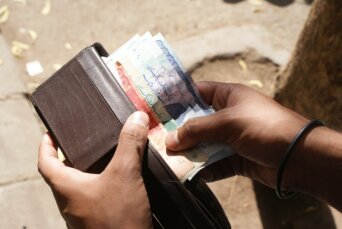- About
- Topics
- Picks
- Audio
- Story
- In-Depth
- Opinion
- News
- Donate
-
Signup for our newsletterOur Editors' Best Picks.Send
Read, Debate: Engage.

| topic: | Transparency and Corruption |
|---|---|
| located: | Pakistan |
| editor: | Shadi Khan Saif |
Pakistan’s top officials have been celebrating the deal to secure $3 billion through the International Monetary Fund at a time when the nation of over 200 million is reeling from hyper-inflation. The key question is whether this enormous amount of additional loan will worsen the country’s crippling debt crisis or whether it can serve as a wake-up-call to set the State in order?
Pakistan's leadership has come under scrutiny the country's increasing reliance on loans, despite the fact that its public debt and liabilities currently stand at an estimated $140 billion, which amounts to approximately 93 percent of the nation's gross domestic product.
Over the years, successive governments in Pakistan have been borrowing substantial sums from international lenders, as well as countries like China and the Gulf nations, in order to pay off the interest on existing loans. This has led to hyperinflation and mounting economic disparities within the country.
As per the latest deal with the IMF, the lender has once again demanded Pakistan to hike its general sales tax rate, among other unpopular measures, in an effort to increase state revenue that will allow the country to pay back the loans. “Steadfast policy implementation is key for Pakistan to overcome its current challenges, including through greater fiscal discipline, a market-determined exchange rate to absorb external pressures, and further progress on reforms, particularly in the energy sector, to promote climate resilience, and to help improve the business climate,” said the IMF in a statement.
Such circumstances obviously demand a tightening of the belt. Over the years, the ruling elite has been opting for a quick fix to the country’s economic crisis - constantly raising the prices of petroleum products, electricity and gas, which has directly affected millions of Pakistanis living in poverty.
Just days before striking the deal with the IMF, the government raised the prices, yet again, to lure the lender. Conservative estimates suggest poverty is likely to reach 39 percent in Pakistan. How can a poor or jobless person afford to pay more for their energy bill?
Instead of celebrating this IMF deal and passing the burden of the debt crisis to the next government, authorities in Pakistan should take up the serious role of a responsible and sensible leaders by slashing unnecessary government spendings, stop the wastage of resources due to endemic corruption and create jobs for the youth at home and abroad through quality education and training.
Instead of looking at and treating the massive youth population as a liability, the policy makers and those in power also need to generously invest resources and time in the education of boys and girls so they can take their country on the path of prosperity.
Image by Zeeshan Tejani
